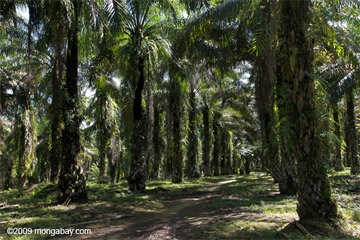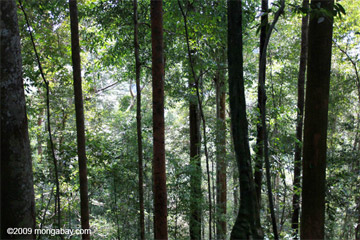Fonterra, the world’s largest dairy exporter, is contributing to destruction of rainforests in Southeast Asia through its consumption of palm kernel as animal feed, alleges Greenpeace.
The environmental group says that New Zealand’s dairy industry is one of the world’s largest consumers of Palm Kernel Expeller (PKE), an animal feed product derived from oil palm plantations in Indonesia and Malaysia. Around 95 per cent of New Zealand’s dairy farms are shareholders within Fonterra.
“It’s a scandal that Fonterra is feeding its dairy cows a product that is directly contributing to the destruction of the world’s remaining rainforests and to increased climate change,” said Simon Boxer, Greenpeace New Zealand climate campaigner. “This makes no sense and the New Zealand Government needs to stop Fonterra importing palm kernel expeller into New Zealand.”
|
|
Fonterra is using PKE as supplemental feed to boost productivity of dairy farms, thereby increasing profitability. Greenpeace reports that PKE imports to New Zealand are rising rapidly, climbing from 400 tons in 1999 to over 1.1 million tons in 2008. New Zealand presently accounts for 25 percent of global trade in PKE.
Greenpeace says this growing reliance on PKE, which is a product of palm oil production, carries a high environmental cost.
“Over 1.5 million hectares of palm plantations planted on previously rainforested land in Malaysia and Indonesia would have been needed to meet the 2008 New Zealand imports of PKE,” the group said in a statement. Greenpeace also notes that “none of the PKE imported into New Zealand meets stringent sustainability guidelines,” including certification standards set by the Roundtable on Sustainable Palm Oil (RSPO).
“Fonterra’s intensification of the dairy industry is fuelling rainforest destruction, increasing greenhouse gas emissions here and abroad, putting pressure on the health of our land and threatens our clean, green reputation,” said Boxer. “That’s the cost – and I can’t imagine that there are many New Zealanders, including the farming community, that would find this situation acceptable.”
Greenpeace’s campaign comes shortly after consumer protests led Cadbury New Zealand to stop using palm oil as a replacement for cocoa butter in its milk chocolate products. Cadbury had switched to palm oil due to its lower cost.
Recent research has shown that more half of oil palm plantation expansion in Indonesia and Malaysia between 1990 and 2005 occurred at the expense of natural forests, reducing the extent of habitat for critically endangered species like orangutans, Sumatran tigers, and Sumatran rhinos, and contributing billions of tons of greenhouse gases to the atmosphere. The palm oil industry contends the higher yields of its crop makes it a more productive alternative to other vegetable oils.
Related articles
Cadbury dumps palm oil after consumer protests

(08/17/2009) Cadbury New Zealand, responding to widespread consumer protests, will stop adding palm oil to its milk chocolate products, reports the New Zealand Herald. The candy-maker substituted palm oil and other vegetable fat for cocoa butter earlier this year. The company cited cost savings for the decision, but the move triggered outcry from environmental groups who blame palm oil production for destruction of rainforests across Indonesia and Malaysia, key habitat for orangutans and other endangered species. Concerns that Cadbury chocolate could be imperiling orangutans led the Auckland Zoo and others to ban Cadbury products. Meanwhile consumers swamped the company with letters and petitions protesting its use of palm oil.
Issues around palm oil development prove complex, controversial
(08/12/2009) A new report from published by the Center for International Forestry Research (CIFOR) highlights the benefits — and controversies — of large-scale expansion of oil palm agriculture in Southeast Asia. The review, titled “The impacts and opportunities of oil palm in Southeast Asia: What do we know and what do we need to know?”, notes that while oil palm is a highly productive and profitable crop, there are serious concerns about its environmental and social impact when established on disputed land or in place of tropical forests and peatlands.
LUSH cosmetics launches campaign against palm oil
(08/10/2009) LUSH Cosmetics, a leading cosmetics-maker, will no longer use palm oil due to environmental concerns over its production. LUSH, which is now selling a palm oil-free soap, has launched a two-pronged campaign to make consumers aware of the impacts of palm cultivation on tropical forests and encourage other consumer-products companies, including Procter & Gamble, Unilever and Nestle, to reformulate their products using alternatives to palm oil.

